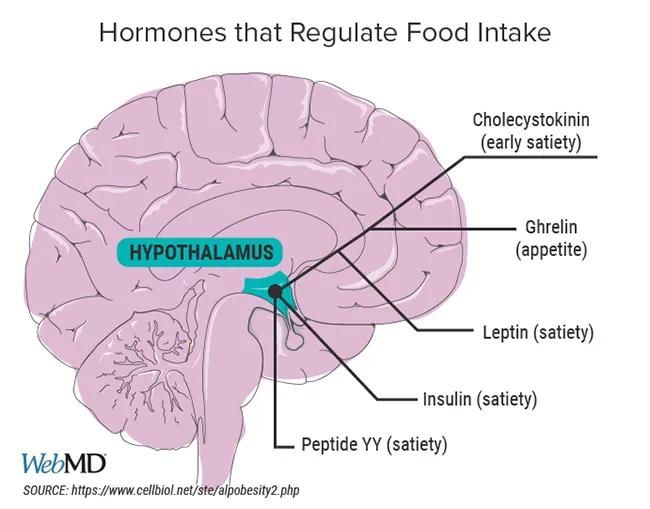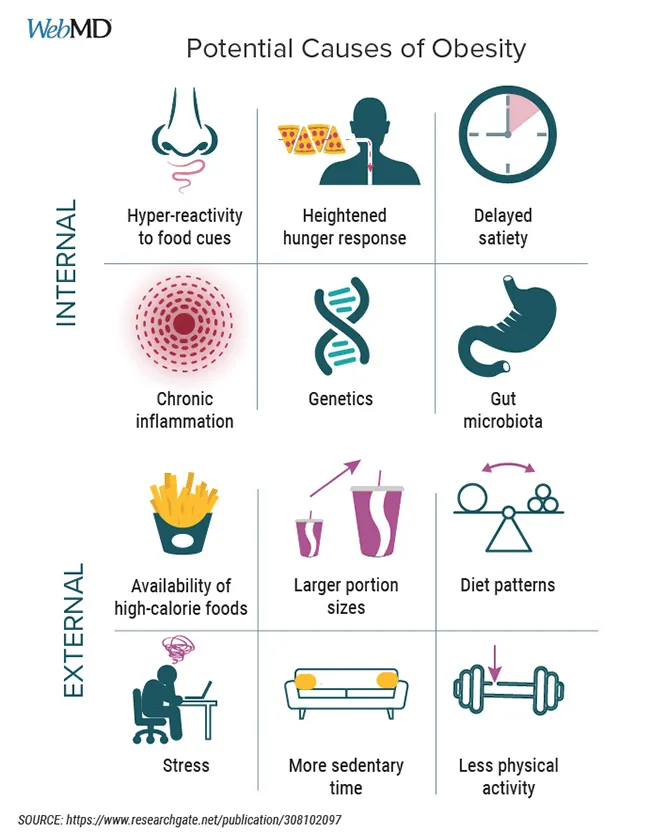
[ad_1]
Dec. 15, 2023 – For a lot of his life, 32-year-old Michael Smith had a conflict occurring in his head.
After an enormous meal, he knew he ought to be full. However an inexplicable starvation would drive him to select up the fork once more.
Cravings for fried rooster or gummy bears overwhelmed him, fueling late-night DoorDash orders that – regardless of their bounty of fats and sugar — by no means happy him.
He remembers waking up on the sofa, half-eaten takeout in his lap, feeling sluggish and uncontrolled.
“It was like I used to be meals drunk,” remembers Smith, who lives in Boston. “I had a second I checked out myself within the mirror. I used to be round 380 kilos, and I mentioned, ‘OK, one thing has obtained to offer.’”
Smith is among the many 42% of U.S. adults dwelling with weight problems, a misunderstood and stubbornly hard-to-manage situation that medical doctors have solely just lately begun to name a illness. Its root causes have been debated for many years, with research suggesting all the pieces from genes to way of life to a shifting meals provide loaded with carbohydrates and ultra-processed meals. Options have lengthy focused self-discipline and a easy “eat much less, transfer extra” technique with remarkably grim outcomes.
Those that efficiently slim down have a tendency to realize again 50% of that weight inside 2 years, and 80% inside 5 years. In the meantime, the weight problems epidemic marches on.
However a brand new frontier of brain-based therapies – from GLP-1 agonist medication thought to behave on reward and urge for food facilities to deep mind stimulation geared toward resetting neural circuits – has kindled hope amongst sufferers like Smith and the medical doctors who deal with them. The remedies, and theories behind them, will not be with out controversy. They’re costly, have negative effects, and, critics contend, pull focus from weight-reduction plan and train.
Howevermost agree that within the battle in opposition to weight problems, one essential organ has been neglected.
“Weight problems, in nearly all circumstances, is most definitely a dysfunction of the mind,” mentioned Casey Halpern, MD, an affiliate professor of neurosurgery on the College of Pennsylvania. “What these people want will not be merely extra willpower, however the therapeutic equal of an electrician that may make proper these connections inside their mind.”

A Break within the Machine
All through the day, the machine that’s our mind is continually buzzing within the background, taking in refined indicators from our intestine, hormones, and surroundings to find out once we’re hungry, how meals makes us really feel, and whether or not we’re taking in sufficient vitality, or expending an excessive amount of, to outlive.
“We wish to suppose that we now have management over what we eat, however the mind can be integrating all of those elements that we don’t absolutely perceive in ways in which form our choices,” mentioned Kevin Corridor, PhD, an weight problems researcher with the Nationwide Institute of Diabetes and Digestive and Kidney Ailments. “I liken it to holding your breath. I can try this for a time frame, and I’ve some aware management. However ultimately, physiology wins out.”
Mounting proof means that in individuals with weight problems, one thing within the machine is damaged.
One seminal 2001 research in The Lancet advised that, like individuals hooked on cocaine or alcohol, they lack receptors to the feel-good mind chemical dopamine and overeat in pursuit of the pleasure they lack.
A latest research, not but printed, from Corridor’s lab drew a barely totally different conclusion, suggesting that folks with weight problems even have an excessive amount of dopamine, filling up these receptors so the pleasure spike from consuming doesn’t really feel like a lot.
“It’s form of like making an attempt to shout in a loud room. You’re going to need to shout louder to have the identical impact,” mentioned Corridor.
Intestine-brain pathways that inform us we’re full may additionally be impaired.
In one other research, Yale researchers tube-fed 500 energy of sugar or fats instantly into the stomachs of 28 lean individuals and 30 individuals with weight problems. Then they noticed mind exercise utilizing purposeful magnetic resonance imaging (fMRI).
In lean individuals, about 30 areas of the mind quieted after the meal, together with components of the striatum (related to cravings).
In these with weight problems, the mind barely responded in any respect.
“In my clinic, sufferers will usually say ‘I simply completed my dinner, but it surely doesn’t really feel prefer it,’” mentioned senior creator Mireille Serlie, MD, PhD, an weight problems researcher on the Yale College of Drugs. “It could be that this nutrient-sensing interplay between the intestine and the mind is much less pronounced or comes too late for them after the meal.”
Halpern just lately recognized a mind circuit linking a reminiscence heart (hippocampus) to an urge for food management area (hypothalamus). In individuals with weight problems and binge consuming dysfunction, the circuit seems jammed. This will likely trigger them to, in a way, overlook they only ate.
“A few of their consuming episodes are nearly dissociative – they’re not realizing how a lot they’re consuming and may’t preserve monitor of it,” he mentioned.
One other mind system works to take care of longer-term homeostasis – or weight stability. Like a set thermostat, it kicks on to set off starvation and fatigue when it senses we’re low on fats.
The hormone leptin, present in fats cells, sends indicators to the hypothalamus to let it understand how a lot vitality we now have on board.
“If leptin ranges go up, it indicators the mind that you’ve an excessive amount of fats and you need to eat much less to return to the place to begin,” mentioned Rockefeller College geneticist Jeffrey Friedman, MD, PhD, who found the hormone in 1994. “In case you have too little fats and leptin is low, that can stimulate urge for food to return you to the place to begin.”
In individuals with weight problems, he mentioned, the thermostat – or set level the physique seeks to take care of – is simply too excessive.
All this raises an important query: How do these circuits and pathways malfunction within the first place?

What Breaks the Mind?
Genes, scientists agree, play a task.
Research present that genetics underlie as a lot as 75% of individuals’s variations in physique mass index (BMI), with sure gene mixtures elevating weight problems threat specifically environments.
Whereas lots of of genes are believed to have a small impact, a few dozen single genes are thought to have a big impact. (Notably, most affect mind perform.) For example, about 6% of individuals with extreme weight problems since childhood have mutations in a gene known as MC4R (melanocortin 4 receptor), which influences leptin signaling.
Nonetheless, genetics alone can’t account for the explosion in weight problems within the U.S. over the past 50 years, says epidemiologist Deirdre Tobias, ScD, an assistant professor of drugs at Harvard Medical College.
On the inhabitants stage, “our genes don’t change that a lot in lower than a technology,” she mentioned.
However our meals provide has.
Extremely-processed meals – these containing hydrogenated oils, high-fructose corn syrup, flavoring brokers, emulsifiers, and different manufactured components – now make up about 60% of the meals provide.
“The proof is pretty constant indicating that there’s one thing about these meals that’s presumably inflicting weight problems,” mentioned Tobias.
In a single telling 2019 research, Corridor and his colleagues introduced 20 women and men right into a research heart to dwell for a month and tightly managed their meals consumption and exercise. One group was supplied with meals with 80% of energy from ultra-processed meals. The opposite was given meals with no processed meals.
The three every day meals offered had the identical energy, sugars, fat, fiber, and carbohydrates, and folks have been informed to eat as a lot as they wished.
These on the ultra-processed weight-reduction plan ate about 500 energy extra per day, ate quicker, and gained weight. These on the unprocessed weight-reduction plan misplaced weight.
“It is a stark instance of how, when you possibly can change the meals surroundings, you trigger actually outstanding adjustments in meals consumption with out individuals even being conscious that they’re overeating,” mentioned Corridor.
Simply what it’s about these comparatively novel meals which will set off overeating is unclear. It might be the crunch, the dearth of water content material, the engineered stability of sugar/salt/fats, their easy-to-devour texture, or one thing else.
Some analysis means that the meals might intervene with gut-brain signaling that tells the mind you’re full.
“Proof is amassing that the dietary content material of processed meals will not be precisely conveyed to the mind,” wrote Dana Small, PhD, a neuroscientist at Yale, in a latest perspective paper in Science.
Much more regarding: Some animal research recommend processed meals reprogram the mind to dislike wholesome meals.
And as soon as these mind adjustments are made, they’re laborious to reverse.
“The issue is, our mind will not be wired for this,” mentioned Halpern. “We’re not developed to eat the meals we’re consuming, so our mind adapts, but it surely adapts in a detrimental approach that places us in danger.”
That’s why altering the meals surroundings by way of public coverage have to be a part of the answer in combating weight problems, Tobias mentioned.

A New Period of Mind-Primarily based Options
Within the spring of 2021, after years of making an attempt and failing to drop pounds by way of the “transfer extra, eat much less” mannequin, Michael Smith started to take a drugs known as Vyvanse. The drug was accepted in 2008 for consideration deficit hyperactivity dysfunction, however because it additionally influences ranges of the hormones dopamine and norepinephrine to scale back cravings, it’s now regularly prescribed for binge consuming dysfunction.
“That was just about how I removed my first 60 to 70 kilos,” Smith mentioned.
A number of months later, after he hit a plateau, he had surgical procedure to shrink the dimensions of his abdomen – a choice he now second-guesses.
Whereas it stored him from overeating for a time, the fried rooster and gummy bear cravings returned a couple of months later.
His physician, Fatima Cody Stanford, MD, put him on a second treatment: semaglutide, or Wegovy, the weekly shot accepted for weight reduction in 2021. It really works, partly, by mimicking glucagon-like peptide-1 (GLP-1), a key intestine hormone that lets your mind know you might be full.
The load started to fall off once more.
Smith’s success story is only one of many who Stanford, an weight problems medication doctor-scientist at Harvard, has heard in her workplace lately.
“I don’t consider these medication are a panacea,” she mentioned. “There are non-responders, and people are the sufferers I take off the treatment. However for the high-responders, and there are various of them, they’re telling me, ‘Oh my gosh. For the primary time in my life, I’m not continuously desirous about consuming. My life has modified.’”

A Multi-Pronged Strategy
Halpern, at Penn, has additionally been listening to success tales.
In recent times, he has positioned everlasting electrodes within the brains of three individuals with grade III, or extreme, weight problems and binge consuming dysfunction.
All had tried train, weight-reduction plan, assist teams, treatment, and weight reduction surgical procedure to no avail.
The electrodes modulate an space within the heart of the mind known as the nucleus accumbens, which in mice research has been proven to scale back cravings when stimulated.
So far, all three are seeing promising outcomes.
“It’s not like I don’t take into consideration meals in any respect,” one among them, Robyn Baldwin, informed The New York Occasions. “However I’m now not a craving particular person.”
Halpern is now extending the trial to extra sufferers and hopes to finally embrace different areas of the mind, together with people who contain reminiscence.
He imagines a day when individuals with extreme weight problems, who’ve failed typical remedies, can stroll right into a clinic and have their mind circuits assessed to see which of them could also be misfiring.
Many would possibly discover aid with noninvasive mind stimulation, like transcranial magnetic stimulation (already in use for melancholy). Others would possibly want a extra excessive strategy, just like the deep mind stimulation, or DBS, remedy Halpern used.
“Clearly, DBS is tough to scale, so it must be reserved for essentially the most extreme sufferers,” he mentioned.
Nonetheless, not everybody believes brain-based medication and surgical procedures are the reply.
David Ludwig, MD, PhD, a professor of diet on the Harvard College of Public Well being, performed a key function within the discovery of GLP-1 and acknowledges that “in fact” the mind influences physique composition. However to him, explaining weight problems as a illness of the mind oversimplifies it, discounting metabolic elements akin to an inclination to retailer an excessive amount of fats.
He famous that it’s laborious to get drug corporations, or any businesses, to fund giant medical trials on easy issues like low-carbohydrate diets or train applications.
“We’d like all of the instruments we will get within the battle in opposition to the weight problems epidemic, and new applied sciences are value exploring,” he mentioned. “Nevertheless, the success of those medication shouldn’t lead us to deprioritize weight-reduction plan and way of life interventions.”
Stanford, who has obtained consulting charges from Wegovy, believes the way forward for remedy lies in a multi-pronged strategy, with surgical procedure, treatment, and way of life adjustments coalescing in an enduring, however fragile, remission.
“Sadly, there isn’t any remedy for weight problems,” mentioned Stanford, whose sufferers usually have setbacks and should strive new methods. “There are remedies that work for some time, however they’re continuously pushing up in opposition to this origin within the mind.”
Smith says understanding this has been an enormous a part of his success.
He’s now a leaner and more healthy 5-foot-6 and 204 kilos. Along with taking his treatment, he walks to work, goes to the gymnasium twice every week, limits his parts, and tries to reframe the way in which he thinks about meals, viewing it as gasoline relatively than an indulgence.
Generally, when he appears to be like within the mirror, he’s reminded of his 380-pound self, and it scares him. He doesn’t wish to return there. He’s assured now that he gained’t need to.
“There’s this false impression on the market that you simply simply must put the fork down, however I’m studying it’s extra sophisticated than that,” he mentioned. “I intend to deal with this because the sickness that it’s and do what I must fight it so I’m in a position to preserve this new actuality I’ve constructed for myself.”
[ad_2]